Robert E. Lee living historian laments: ‘People are trying to erase history’
The Lee / Jackson Monument in Wyman Park, Baltimore, Maryland. (Anthony C. Hayes)
In recent weeks, a revisionist movement has swept the nation; as some, outraged by the murderous act of one lunatic, have turned their collective wrath on the last vestiges of the long dispatched Confederacy. This outrage has included an effort here in Baltimore to strike the name of Robert E. Lee from one city owned park and to remove a statute of Lee and Stonewall Jackson from an open public space.
To gain some perspective on the life of Robert E. Lee, the Baltimore Post-Examiner spoke with retired educator and living historian Frank Orlando of Arlington House Impressions. Mr. Orlando portrays General Lee in living history lectures and at events near his home in Gettysburg.
BPE: Thank you for taking some time to talk with us today. Before getting specifically to Robert E. Lee, could you please speak to the current Confederate Flag controversy from the perspective of an historian.
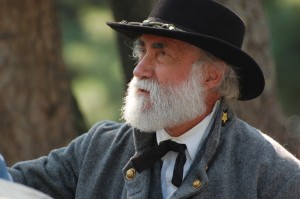
Orlando: It seems to me that some people today are trying to sanitize history. The unfortunate part is it’s a minority who have seized upon what happened in South Carolina. That man (Dylann Roof) was deranged, but they think what he did was because of the Confederate flag. They are under the impression that the Confederate flag stands for racism, which is truly unfortunate. I like to refer to the War Between the States as a fringe war. By that, I mean, five percent of the people in the North despised slavery; five percent of the people in the South supported slavery; but the other ninety percent believed in the Constitution of the United States.
Most of those men who fought for the Confederacy believed in the concept of state’s rights, which are guaranteed to us in the 10th Amendment. That Amendment states that any power not delegated to the Federal government becomes the sole power of the states – and most importantly, of the people. Our forefathers believed wholeheartedly in the people – so much so, that the first three words in the Preamble to the Constitution are, “We the people…” There was also a financial angle. In 1860, sixty percent of the Federal budget was dependent on the South and their exports because of the Tariff Act. Slavery was an issue; there is no disputing that. In fact, Robert E. Lee despised slavery. He felt quite strongly that no man should own another man. He said that was contrary to what Our Lord and Creator meant for mankind. People need to sit down and learn history.
BPE: Getting to the subject at hand, how long have you been portraying Robert E. Lee?
Orlando: Seven years.
BPE: How did this performance evolve?
Orlando: I was always interested in history. I was an English teacher and then a high school principal, but I was always concerned that what was being taught in the classroom was being dictated by the history of the time. Most people don’t know that the eight years of his life that Lee was proudest of, were the years he spent as an educator – five years as the President of Washington College in Lexington, Virginia, and three years as the Superintendent at West Point. He always felt that we – as human beings – are proudest of the things we help to build up. Not the things we tear down. As a professional soldier, and specifically as the commanding general of the Army of Northern Virginia, he was making decisions which sent his men into harm’s way, and that bothered him immensely. So for me, as an educator, the segue was perfect.
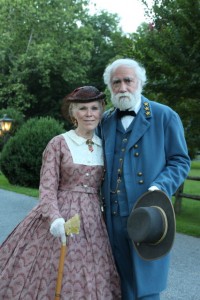
What I do now is continue to educate. History is written by the victors, and not everyone understands what actually transpired during those four years (1861 -1865) and what led up to the war and the ensuing years. Everything I present is predicated on correspondence between Lee and his family; Jefferson Davis, General Winfield Scott and people like that. By doing it that way, I make sure everything I present is truthful.
BPE: And your wife portrays Mrs. Lee?
Orlando: My wife Bonnie has been portraying Mary Custis Lee for six years. Mary Lee was a sassy, Southern belle who might have been the first women’s libber in the U.S. She, like her husband, was a staunch Unionist. The two of them prayed that Virginia would not secede, but once it did, they threw their loyalty behind the Old Dominion state. On numerous occasions, Lee told his sons that there was no sacrifice he would not make to preserve the Union, save that of honor.
BPE: You mentioned General Scott, who was Lee’s commanding officer during the Mexican War. Did Lee’s decision to join the Confederacy affect his relationship with Scott?
Orlando: Yes, but you’ve got to remember that in 1861, Lee was offered command of the Union Army by Francis Blair – who was speaking on behalf of Winfield Scott, Simon Cameron (the Secretary of War) and Abraham Lincoln. Lee did not want to wage war against his fellow Americans. The two words which define Robert E. Lee are Duty and Honor. He always said they are the most sublime words in the English language. Lee always felt that his duty was to his home state of Virginia. He loved the United States and told people that the United States clothed him with education and honor. It was true; and, probably one of the hardest decisions any human being has ever made, was when Robert E. Lee rejected Command of the United States Army. He did not want Virginia to secede, but once that happened, he said he could not bring himself to raise his arm, his hand, his sword against his birthplace, his home, his family – against Virginia.
BPE: But in turning down the command of the Union Army and going South, Lee didn’t just simply assume command of the Confederate Army?
Orlando: Oh, no. He was offered the command of the military forces of the Commonwealth of Virginia. That was April 23, 1861. He was not offered a command in the Confederate Army until after they moved the capitol to Richmond. And even then, he wasn’t the supreme commander of the Confederate Army. He was third or fourth in line. You had Joseph E. Johnston, P.G.T. Beauregard and Albert Sydney Johnston ahead of him. The man who was actually in command of the entire Confederate military was Samuel Cooper. Cooper was Jefferson Davis’ right hand man, but how many people have ever heard of him?
BPE: You say that Lee’s decision to turn down command of the Union Army was based on Duty and Honor. What did that decision ultimately cost him?
Orlando: In a word – everything. His wife Mary was the great-granddaughter of Martha Washington. Her father built Arlington Plantation. In 1863, the Federal government confiscated the property for $92.07 in unpaid taxes and (some say for spite) converted it into Arlington National Cemetery. So his family lost everything. Lee also shared in the privations of his fellow citizens. When his army traveled, he stayed in a tent – not in a house – even though his health was in decline. He was determined to go through whatever his men went through.
BPE: Is it true that, at Appomattox, General Grant refused to accept Lee’s sword?
Orlando: That is correct. Lee offered the sword to him, but Grant said no. There was such a high level of respect for Robert E. Lee. Grant went out of his way to do anything he could for Lee. He asked Lee, “What can I do for you?”, and Lee replied, “My men are starving. We could use 10,000 rations”. Grant said, “I’ll give you 25,000.” Grant also allowed Lee’s men to keep their own horses – and in some cases, their guns – knowing the men would need both for farming and hunting to feed their familes. It was really magnanimous. Everyone there, except for Union Generals Sheridan and Custer, agreed that the war needed to come to an end, and it was time to start restoration. Not reconciliation; Lee always looked at it as restoration and wanted to see the country come together, as it was prior to the conflict.
BPE: If the South was beaten, why did Sheridan and Custer want the war to continue?
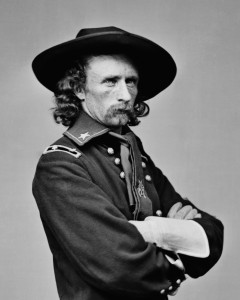
Orlando: They were war mongers – and that’s not hyperbole.
Custer graduated last in his class in 1861, and Sheridan was even one of Lee’s students at West Point. They just hated the South. Both tried to convince Grant to continue the war and completely destroy the Army of Northern Virginia, which by 1865 was down to about 8,400 actives. Of course, both were later involved in the slaughter of the American Indians, which began when Lincoln sent General Pope to Minnesota to expel the Dakotas. Custer’s ego eventually cost him his life, along with the lives of more than two hundred of his own men.
BPE: Getting back to Grant allowing some of Lee’s men to keep their arms, wasn’t that highly unusual? After all, there was some talk of the South continuing the war as more of a guerrilla operation.
Orlando: Yes, it was unusual; but to be clear, they kept some guns, but not too many. The last thing you want to do as a commanding general is allow your former enemy to stay well armed.
BPE: Once the war was over, how was Lee seen by his contemporaries?
Orlando: Lee lost a lot of friends and some of his luster in the South, because once he signed the surrender at Appomattox, he urged his men to go home and be good Americans.
In the North, however, they were very appreciative of Lee. The Democrat party actually wanted him to run for the Presidency, but by that time, the Republicans had already decided upon Grant and Lee said, no – I will not run against General Grant. Lee was also suffering from the heart problems he had developed during the war. That, along with a stroke, was what finally killed him on October 12, 1870.
BPE: He died in Lexington, Virginia at Washington College?
Orlando: Yes, and he’s buried there, as are his wife and his children. His horse Traveller is also buried there, just outside of the chapel.
BPE: Did Lee and Grant ever meet again after Appomattox?
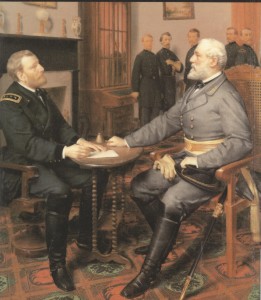
Orlando: Lee and Grant met once, in 1868, in the White House for approximately 15 minutes. While no notes were taken, I am led to believe that Grant’s invitation was extended to thank Lee for the positive and supportive manner he took on reconciling / restoring the country. As I said, Lee strongly recommended to all Southern parents that they raise their children to be good Americans and to forget all of the animosity that permeated the country before, during, and after the War.
BPE: So that would make Lee the only American to ever be stripped of his citizenship – and then be invited to the White House? That’s pretty amazing. He had Grant’s respect, but did Lee inspire any subsequent military figures?
Orlando: Well, he was quite audacious. Many people, including MacArthur, Eisenhower and Churchill have basically said that Lee was the greatest military mind that was ever developed by the United States. Teddy Roosevelt said so, too. Others revere him, because he was a gentleman and a Christian, and that is how Lee preferred to be known.
One story most people don’t know is that two weeks after Appomattox, Lee was attending church at St. Paul’s Episcopal Church in Richmond. When it came time for communion, a Black man, who was sitting in the balcony, came down to the altar. The Whites in the congregation where aghast that any Black would have the temerity to do such a thing, but Robert E. Lee stood up and stepped out of his pew – went up to the altar, knelt down next to the Black man and took communion with him. Lee felt quite strongly about moving the country to where it should be.
BPE: How has history judged Robert E. Lee?

Orlando: It’s difficult to gauge in this day and time, because of the controversy surrounding the Confederate flag and the lingering effects of racism, but he is still respected by military personnel. I speak to a lot of veteran’s groups and have been invited to various war colleges, and people there still respect him immensely. For four years – in the face of overwhelming odds – he didn’t capitulate. He also waged war like a gentleman. When the Army of Northern Virginia moved into Maryland and then on to Pennsylvania in 1863, the Union Army had already indiscriminately destroyed the countryside in the South. But Lee gave specific orders that his men were NOT to destroy civilian property and insisted that whatever they’d take as they marched, they were to compensate townspeople and farmers with gold or Confederate script. He did not believe an army should fight a civilian population. An army fights an army. Sherman and Grant did not see it that way. They felt quite strongly that, to win the war, they needed to destroy the civilian mind set and Confederacy’s will to fight.
BPE: The Union strategy then was quite a departure from conventional war?
Orlando: Yes, at least certainly in modern times. I like to point out that what we did to Hiroshima and Nagasaki has its roots in what Grant did to Vicksburg and Sherman did to Atlanta. In a sense, you can’t fault them. They wanted to end the war as soon as possible. You can fault Lee, if you will, for being inflexible in that regard and not wanting to harm innocent men, women and children.
BPE: What is your take on the current trend to remove monuments and expunge Lee’s name and memory from public parks and other institutions?
Orlando: He was a great man – plain and simple. He was an educator; the Superintendent at West Point. He was a consummate gentleman and a committed Christian. How they can remove his name and (Stonewall) Jackson’s – or any name from any memorial is beyond me. They have already done that in Tennessee by removing the Confederate names – including Jefferson Davis – from three parks. By removing Lee’s name from these places, they are basically saying, “We are erasing history.”
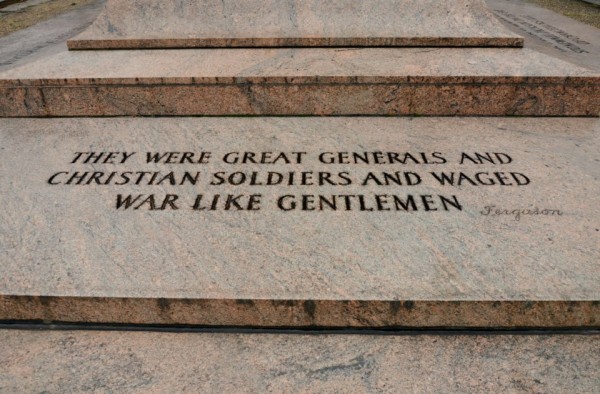

Anthony C. Hayes is an actor, author, raconteur, rapscallion and bon vivant. A one-time newsboy for the Evening Sun and professional presence at the Washington Herald, Tony’s poetry, photography, humor, and prose have also been featured in Smile, Hon, You’re in Baltimore!, Destination Maryland, Magic Octopus Magazine, Los Angeles Post-Examiner, Voice of Baltimore, SmartCEO, Alvarez Fiction, and Tales of Blood and Roses. If you notice that his work has been purloined, please let him know. As the Good Book says, “Thou shalt not steal.”

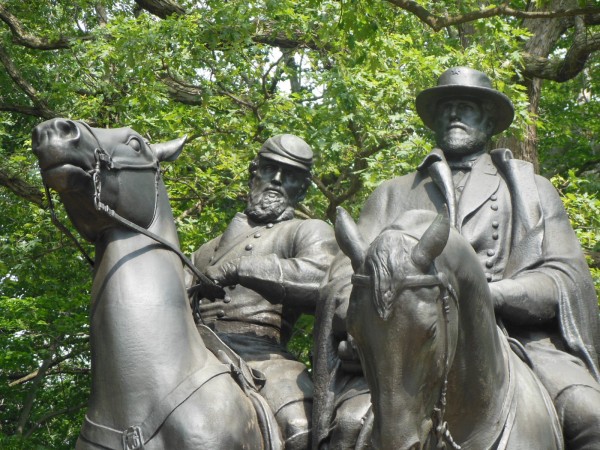
I grew up in Ashland & Mechanicsville VA & now live in Richmond VA. Everywhere I lived or was schooled was in the path of a memorial or battlefield. Lincoln was filmed 45 mins from here. We have SO much steeped in history. We have monument Ave that of course has had monuments desecrated & even talks of removing. It’s mostly civil war generals on it and they’re awe inspiring. So many people I know relic hunt & have personal civil war memorabilia collections. I went to Stonewall Jackson Middle school & Lee Davis High school w/the Confederate as our mascot. We can not wipe this from our history books. The horrors of WWI&II have not been. This was a much different time but is still a part of our history.
Robert E. Lee was widely respected in the North before and during the War as a man of honor. Today, the Leftists extend no such courtesy to him.